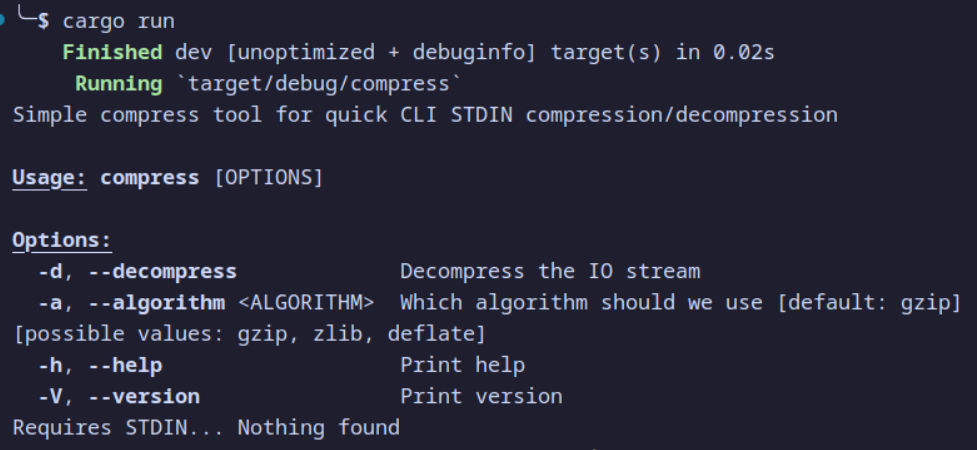Compression Tool Mental Stress Test
-- See project here
Whenever I learn a new language I will read and watch everything I can on that programming language. Once the language's syntax is not complete gibberish to me I will give it a test project. Rust is no different!
I have been working through the analogue version of the Rust Programming Book in addition to some online courses. I decided it was time for me to stress test my understanding of Rust.
Order of Operations
I knew roughly how I wanted to approach the projects iterations. This was my approach...
- Compress a string using GZIP
- Compress STDIN using GZIP
- Decompress from STDIN using GZIP
- Add CLI flags to decompress
- Rewrite to support different compression algorithms
- Add flags to choose algorithm
- Add github workflow release pipeline (just for fun)
Challenges
Given my Rust inexperience I expected to encounter challenges in every step. This is why my project was created in an iterative process. I ended up with many small problems, which is preferable to a handful of very tough problems. Larger problems, in my experience, feel like brick walls instead of boundaries to overcome, this is detrimental to any learning experience.
Using External Crates
This part wasn't too difficult, but in order to get past this I had to navigate using external crates for the first time, digging through examples, and handling basic Rust project configuration. I imagine that this will get easier the more I build projects. Overall, an easy and educational wall to get over.
Learning STDIN
In Golang I am very used to the reader writer interface, I attempted to follow a similar structure in Rust but that strategy had to quickly be abandoned. Digging into the Flate2 crate I was able to take advantage of the examples directory standard in Rust to get a quick copy and paste example. In this project I was trying to avoid going to StackOverflow/Rust Communities.
Clap Crate Confusion
In trying to implement flags I really wanted to avoid using the system args library. It's boring and a little ugly. That's when the Clap crate came to play. I was quickly able to add a flag for compressing and decompressing.
Clap Enums
In preparation of supporting multiple compression types I wanted to add a CLI flag to support algorithms. I could have just used a string or a number but I decided I was going to be extra cool and dust off enums! I quickly learned that Clap does support enums but it would only be after a fight with traits. This would be a common theme from this point forward. In addition to the algorithm selector I also wanted to show the usage help if no STDIN was present. This resulted in lots of digging into clap.
fn main() -> io::Result<()> {
let args = Args::parse();
if atty::is(atty::Stream::Stdin) {
use clap::CommandFactory;
let mut cmd = Args::command();
cmd.print_help()?;
println!("Requires STDIN... Nothing found");
return Ok(());
}
// -- snip --

Generic Traits vs Golang Interfaces
This was probably this biggest time sink in this whole project. It involved reading many articles and hours of experimentation. At a concept level I understood how to implement this, specifically how I would write it in Golang. Unfortunately for me this wasn't like Golang and was not like the basic trait examples in Rust. The project became more difficult because I was trying to add a trait to a foreign struct that already had implemented a different trait that accepted a generic. This was several layers deeper and more complex than I was ever expecting to run into. I tried all kinds of different forms (see below). Finally I landed on the last one.
impl Method for GzEncoder
impl Method for GzEncoder<W>
impl Method for GzEncoder<dyn Write>
impl<W: Write> Method<W> for GzEncoder<W>
impl Method for GzEncoder<Vec<u8>>
Borrow Traits and Boxes
Once the trait was finally working I ran into an issue when adding multiple compression types. This is because I had a match that I hoped would return a struct that implemented my trait. I then wanted to use the returned struct in my STDIN work to compress/decompress, however Rust was very unhappy that the first case returned a GzEncoder and the second returned ZLibEncoder. While they both have the Method trait they were not the same struct and this was a problem.
pub fn compress(&self) -> impl Method {
match self {
Self::GZIP => GzEncoder::new(Vec::new(), Compression::default()),
// -- Snip --
}
}
After banging my head against the wall I realized I should use a Box<dyn Method> type. I felt like a genius, I wrote the code at the speed of light. I have unlocked the final frontier of Rust. Nothing can stop me!
error[E0161]: cannot move a value of type `dyn Method`
Clearly I didn't understand Box as much as I thought I did. Digging into this issue I realized you can't pass ownership the value in the Box so when I call the internal method self.finish() in the trait implementation the compiler becomes unhappy. To resolve this I refactored my code, I created a default function in the trait. This allowed me to do all the STDIN work once and not have to worry about passing ownership. Instead of my match returning Box<dyn Method> or impl Method I just trigger run() on the appropriate compression algorithm and get my Vec<u8>. Success!
Conclusion
This was a solid project that resulted in a pretty cool CLI tool that I might actually use. The biggest challenge was making my code generic in an attempt to reduce overhead. With that one requirement I made this project a lot harder than I thought it would be. I would like to continue to update this project and add tests and remove leaning so hard on STDIN, it would be nicer to allow for different inputs like a file, string, or STDIN. For now I'm content.